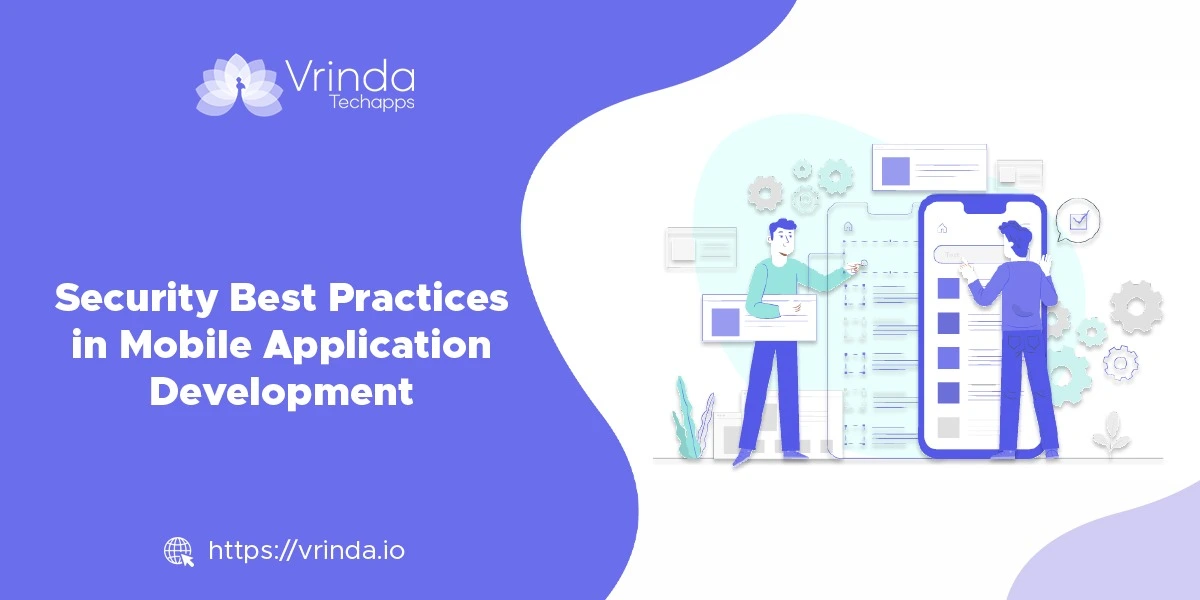
Security Best Practices in Mobile ApplicationDevelopment
- October 26, 2023
- 3 min read
In today’s digital-centric world, mobile apps serve as the central pillar for countless businesses. As these apps accumulate users and manage sensitive details, they’re increasingly in the cross-hairs of hackers. Thus, fortifying mobile app security is not just a luxury but an imperative.
For business executives, embracing and deploying up-to-date mobile application development solutions and strategies to reinforce mobile app security could be the line between success and a potential cyber calamity. This piece provides insights into leading security methodologies for mobile app design.
1. Securing Data
A truly protected mobile app hinges on its data management approach. In light of advancing cyber threats, mere password defences are insufficient. Firms must guarantee that their apps’ stored or shared data is encrypted. Using the Advanced Encryption Standard (AES) for data encryption is commonly endorsed. By encrypting data both while transferring (via methods like TLS) and when stored, organizations can deter unauthorized access and potential data leaks.
2. Enhanced User Verification
Verifying identities is pivotal. It’s essential to incorporate strong authentication techniques to ensure only authorized individuals access the app’s functionalities and data. Modern standards include two-factor authentication (2FA) and biometric verifications such as fingerprint or facial scans. Furthermore, bypass saving authentication tokens or passcodes on devices. Opt for systems like OAuth or OpenID, which grant restricted access and can be remotely invalidated if breached.
3. Strengthening API Connections
Numerous apps utilize Application Programming Interfaces (APIs) for data transmission. Every API interaction is a possible security weak spot.
- API Rate Limits:Restrict the API requests from an individual user or device within set intervals to ward off exhaustive attack attempts.
- HTTPS Protocol: Prioritize HTTPS for all API communications to ensure encrypted data exchanges.
- Token-Based Authorization: Employ temporary tokens for API communications rather than direct credentials.
4. Routine Security Checks & Ethical Hacking
Adopt an attacker’s mindset. Periodic security evaluations and ethical hacking can pinpoint weak spots before they’re manipulated. Engaging external cyber security experts offers a new viewpoint, potentially spotting overlooked vulnerabilities.
5. Clean and Safe Code Practices
Many breaches stem from code weak spots. Guaranteeing a secure code foundation for your app is a pre-emptive measure against potential threats.
- Code Obfuscation: Scramble or confuse your code to deter hackers from deciphering and altering it.
- Prudent Third-party Code Use: While external libraries can expedite development, they might also be vulnerable. Thoroughly assess any third-party code before its incorporation.
6. Holistic Device-App Security
Mobile apps integrate with the broader device environment. Ensure this relationship is secure by:
- App Containment: Employ app sandboxing present in many mobile operating systems to restrict app actions, barring unauthorized data or feature access.
- Detection of Modified Devices: Design apps to recognize and limit functions on altered devices, which carry higher security concerns.
7. Educating Users
Users are integral to security. Periodically guide them on safe practices, like avoiding non-official app stores, updating apps and systems regularly, and declining unnecessary permissions.
8. Backend Protections
Mobile app protection isn’t just about user-facing elements; backend servers and data storage need defence.
- Advanced Firewalls: Employ high-end firewall solutions. Systems like Intrusion Detection Systems (IDS) and Intrusion Prevention Systems (IPS) can detect and counteract threats.
- Database Safeguarding: Encrypt critical data within databases. Adopt powerful encryption techniques and refresh encryption keys often.
9. Stay Updated with Dependencies
Apps hinge on multiple dependencies, which can harbour vulnerabilities.
- Dependency Checkers: Utilize tools such as Snyk or Dependabot to periodically check and highlight outdated or vulnerable components.
10. Employing Content Security Measures (CSP)
CSP acts as a protective layer, thwarting Cross-Site Scripting (XSS) and similar attacks.
11. Physical Security Vigilance
Despite having optimal digital security, physical exposures can be a blind spot.
- Remote Data Deletion: For apps handling confidential data, consider options allowing users or admins to erase data if devices are lost or stolen.
- Geo-Restrictions: Curb app features based on geographic zones, making sure certain tasks can only occur in safe, known locales.
12. Adherence to Regulations like GDPR
Particularly for entities active in or catering to the European audience, GDPR adherence is crucial.
- Data Transparency and Consent: Always inform users about data collection and secure their agreement. Establish straightforward data erasure protocols, and allow users easy access to their data.
13. Predictive Threat Analysis
Before app launch, foresee potential hazards by thinking like a hacker.
- Assessing Risks: Determine the app’s most vulnerable sections and allocate resources for their protection. Anticipating potential breach methods aids in proactive defence structuring.
14. Limit Data Accumulation
The less data in your possession, the less enticing your app is for hackers.
- Collect Only What’s Needed: Gather only indispensable data. Refrain from holding sensitive details unless absolutely required.
15. Real-time Surveillance and Record-keeping
Monitor app activities and user behavior live.
- Spotting Irregularities: Monitoring enables apps to detect and halt unusual actions. Live record-keeping aids in retracing and comprehending any potential security occurrences.
To wrap up, as mobile applications,including those built by flutter app development services, grow more integral in the digital realm, their security cannot be an afterthought. Embedding the aforementioned practices can substantially mitigate cyber risks, fostering a secure space for enterprises and their customers. In this digital age, staying current, continuously evolving, and pre-emptively addressing threats is crucial. A solid security stance not just safeguards the organization, but also builds user confidence.
Share this:
Security Best Practices in Mobile Application Development
In today’s digital-centric world, mobile apps serve as the central pillar for countless businesses. As these apps accumulate users and manage sensitive details, they’re increasingly in the cross-hairs of hackers. Thus, fortifying mobile app security is not just a luxury but an imperative.
For business executives, embracing and deploying up-to-date mobile application development solutions and strategies to reinforce mobile app security could be the line between success and a potential cyber calamity. This piece provides insights into leading security methodologies for mobile app design.
Securing Data
A truly protected mobile app hinges on its data management approach. In light of advancing cyber threats, mere password defences are insufficient. Firms must guarantee that their apps’ stored or shared data is encrypted. Using the Advanced Encryption Standard (AES) for data encryption is commonly endorsed. By encrypting data both while transferring (via methods like TLS) and when stored, organizations can deter unauthorized access and potential data leaks.
Enhanced User Verification
Verifying identities is pivotal. It’s essential to incorporate strong authentication techniques to ensure only authorized individuals access the app’s functionalities and data. Modern standards include two-factor authentication (2FA) and biometric verifications such as fingerprint or facial scans. Furthermore, bypass saving authentication tokens or passcodes on devices. Opt for systems like OAuth or OpenID, which grant restricted access and can be remotely invalidated if breached.
Strengthening API Connections
Numerous apps utilize Application Programming Interfaces (APIs) for data transmission. Every API interaction is a possible security weak spot.
- API Rate Limits:Restrict the API requests from an individual user or device within set intervals to ward off exhaustive attack attempts.
- HTTPS Protocol: Prioritize HTTPS for all API communications to ensure encrypted data exchanges.
- Token-Based Authorization: Employ temporary tokens for API communications rather than direct credentials.
Routine Security Checks & Ethical Hacking
Adopt an attacker’s mindset. Periodic security evaluations and ethical hacking can pinpoint weak spots before they’re manipulated. Engaging external cyber security experts offers a new viewpoint, potentially spotting overlooked vulnerabilities.
Clean and Safe Code Practices
Many breaches stem from code weak spots. Guaranteeing a secure code foundation for your app is a pre-emptive measure against potential threats.
- Code Obfuscation: Scramble or confuse your code to deter hackers from deciphering and altering it.
- Prudent Third-party Code Use: While external libraries can expedite development, they might also be vulnerable. Thoroughly assess any third-party code before its incorporation.
Holistic Device-App Security
Mobile apps integrate with the broader device environment. Ensure this relationship is secure by:
- App Containment: Employ app sandboxing present in many mobile operating systems to restrict app actions, barring unauthorized data or feature access.
- Detection of Modified Devices: Design apps to recognize and limit functions on altered devices, which carry higher security concerns.
Educating Users
Users are integral to security. Periodically guide them on safe practices, like avoiding non-official app stores, updating apps and systems regularly, and declining unnecessary permissions.
Backend Protections
Mobile app protection isn’t just about user-facing elements; backend servers and data storage need defence.
- Advanced Firewalls: Employ high-end firewall solutions. Systems like Intrusion Detection Systems (IDS) and Intrusion Prevention Systems (IPS) can detect and counteract threats.
- Database Safeguarding: Encrypt critical data within databases. Adopt powerful encryption techniques and refresh encryption keys often.
Stay Updated with Dependencies
Apps hinge on multiple dependencies, which can harbour vulnerabilities.
- Dependency Checkers: Utilize tools such as Snyk or Dependabot to periodically check and highlight outdated or vulnerable components.
Employing Content Security Measures (CSP)
CSP acts as a protective layer, thwarting Cross-Site Scripting (XSS) and similar attacks.
- Authorized Source Lists: Through CSP, companies can outline trusted sources, ensuring the app only processes or loads sanctioned content.
Physical Security Vigilance
Despite having optimal digital security, physical exposures can be a blind spot.
- Remote Data Deletion: For apps handling confidential data, consider options allowing users or admins to erase data if devices are lost or stolen.
- Geo-Restrictions: Curb app features based on geographic zones, making sure certain tasks can only occur in safe, known locales.
Adherence to Regulations like GDPR
Particularly for entities active in or catering to the European audience, GDPR adherence is crucial.
- Data Transparency and Consent: Always inform users about data collection and secure their agreement. Establish straightforward data erasure protocols, and allow users easy access to their data.
- Predictive Threat Analysis
Before app launch, foresee potential hazards by thinking like a hacker.
- Assessing Risks: Determine the app’s most vulnerable sections and allocate resources for their protection. Anticipating potential breach methods aids in proactive defence structuring.
Limit Data Accumulation
The less data in your possession, the less enticing your app is for hackers.
- Collect Only What’s Needed: Gather only indispensable data. Refrain from holding sensitive details unless absolutely required.
Real-time Surveillance and Record-keeping
Monitor app activities and user behavior live.
- Spotting Irregularities: Monitoring enables apps to detect and halt unusual actions. Live record-keeping aids in retracing and comprehending any potential security occurrences.
To wrap up, as mobile applications,including those built by flutter app development services, grow more integral in the digital realm, their security cannot be an afterthought. Embedding the aforementioned practices can substantially mitigate cyber risks, fostering a secure space for enterprises and their customers. In this digital age, staying current, continuously evolving, and pre-emptively addressing threats is crucial. A solid security stance not just safeguards the organization, but also builds user confidence.
RELATED ARTICLES
Build Beautiful, Natively Compiled Desktop, Mobile, and Web Applications with Flutter – Vrinda TechApps
Imagine holding a master key, one that effortlessly unlocks every digital door, allowing your business to transcend platform boundaries. That’s the power Flutter brings. Expert Flutter app developers transform ambitious concepts into high-performing apps.
Top Flutter App Development Company in Florida 2025
Selecting thetop flutter app development company can be the biggest breakthrough you’ve been searching for, regardless of your company’s size—startup, SME, or growing corporation.
10 Fundamental User Experience (UX) Design Principles Every Designer Should Know in 2025
Explore presenting a treasure map to someone with the ‘X’ scrawled in invisible ink. In our fast-paced environment, that is how a digital product without excellent UX design seems.



